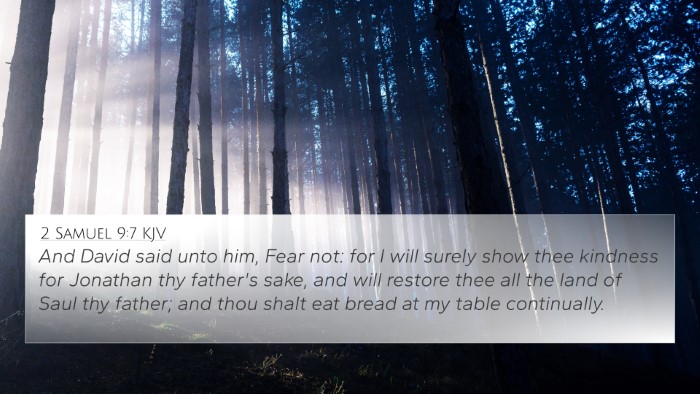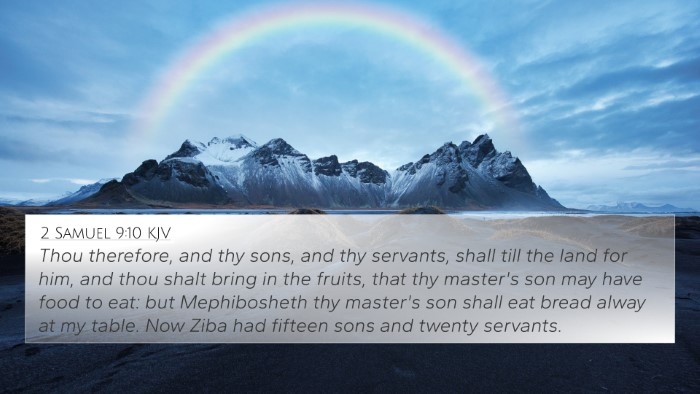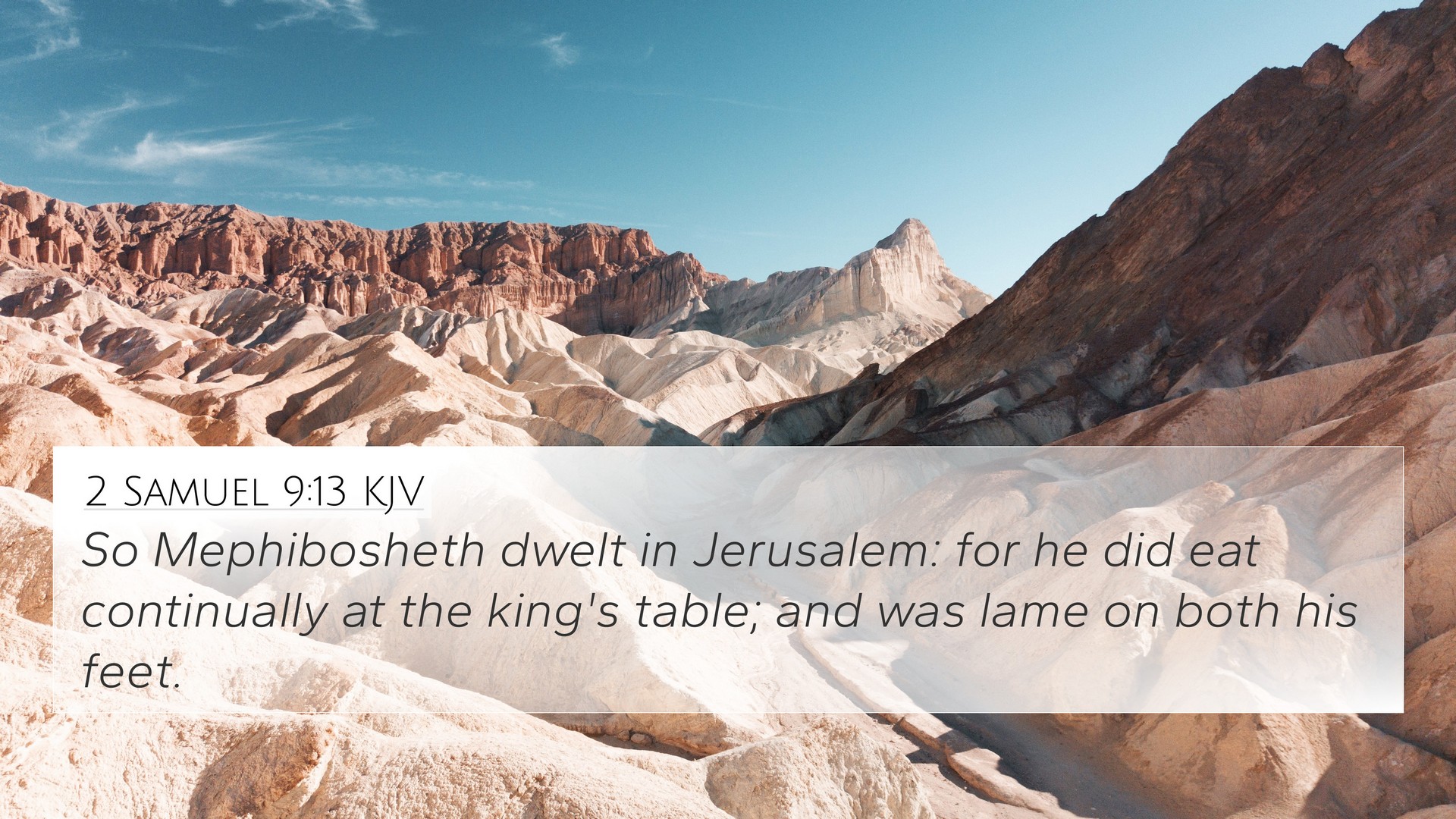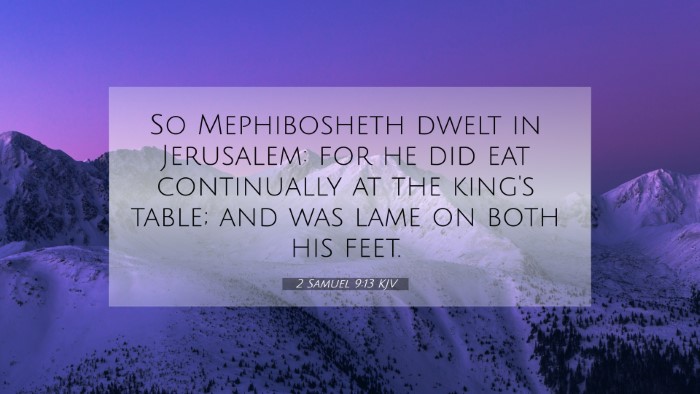Old Testament
Genesis Exodus Leviticus Numbers Deuteronomy Joshua Judges Ruth 1 Samuel 2 Samuel 1 Kings 2 Kings 1 Chronicles 2 Chronicles Ezra Nehemiah Esther Job Psalms Proverbs Ecclesiastes Song of Solomon Isaiah Jeremiah Lamentations Ezekiel Daniel Hosea Joel Amos Obadiah Jonah Micah Nahum Habakkuk Zephaniah Haggai Zechariah Malachi2 Samuel 9:13 Similar Verses
2 Samuel 9:13 Cross References
So Mephibosheth dwelt in Jerusalem: for he did eat continually at the king's table; and was lame on both his feet.
Uncover the Rich Themes and Topics of This Bible Verse
Listed below are the Bible themes associated with 2 Samuel 9:13. We invite you to explore each theme to gain deeper insights into the Scriptures.
2 Samuel 9:13 Cross Reference Verses
This section features a detailed cross-reference designed to enrich your understanding of the Scriptures. Below, you will find carefully selected verses that echo the themes and teachings related to 2 Samuel 9:13 KJV. Click on any image to explore detailed analyses of related Bible verses and uncover deeper theological insights.

2 Samuel 9:7 (KJV) »
And David said unto him, Fear not: for I will surely show thee kindness for Jonathan thy father's sake, and will restore thee all the land of Saul thy father; and thou shalt eat bread at my table continually.

2 Samuel 9:3 (KJV) »
And the king said, Is there not yet any of the house of Saul, that I may show the kindness of God unto him? And Ziba said unto the king, Jonathan hath yet a son, which is lame on his feet.

2 Samuel 9:10 (KJV) »
Thou therefore, and thy sons, and thy servants, shall till the land for him, and thou shalt bring in the fruits, that thy master's son may have food to eat: but Mephibosheth thy master's son shall eat bread alway at my table. Now Ziba had fifteen sons and twenty servants.
2 Samuel 9:13 Verse Analysis and Similar Verses
Understanding 2 Samuel 9:13
Bible Verse: 2 Samuel 9:13 - "So Mephibosheth dwelt in Jerusalem: for he did eat continually at the king's table; and was lame on both his feet."
Verse Summary
This verse describes the situation of Mephibosheth, the son of Jonathan and grandson of King Saul, who, despite his physical disabilities, enjoyed a privileged position at King David's table in Jerusalem. This passage symbolizes grace, mercy, and restoration, illustrating the theme of God's favor on the undeserving.
Commentary Insights
Insights from various public domain commentaries help illustrate the deeper meanings of this verse:
-
Matthew Henry's Commentary:
Matthew Henry emphasizes the kindness of David towards Mephibosheth. Despite being a descendant of Saul, David honors his promise to Jonathan by bringing Mephibosheth into his household. This act also signifies the transformation of enmity into friendship, showcasing the overarching theme of grace in the narrative.
-
Albert Barnes' Notes:
Barnes highlights the physical condition of Mephibosheth as a metaphor for human incapacity and the need for divine grace. The phrase "ate continually at the king's table" reflects not only sustenance but also inclusion and acceptance, illustrating the fullness of life found in being part of God’s family.
-
Adam Clarke's Commentary:
Clarke draws attention to the enduring nature of Mephibosheth's position at the king's table, interpreting it as a representation of God’s unchanging mercy that offers redemption to those who are in need. He also notes how Mephibosheth's lame condition symbolizes humanity's fallen state and the need for healing and restoration through faith.
Thematic Connections
2 Samuel 9:13 interconnects with several biblical themes, which can also be understood through its cross-references:
- Grace and Mercy: Ephesians 2:8-9 - "For by grace are ye saved through faith; and that not of yourselves: it is the gift of God."
- Restoration: Isaiah 61:1 - "The Spirit of the Lord God is upon me; because the Lord hath anointed me to preach good tidings unto the meek; he hath sent me to bind up the brokenhearted."
- Adoption and Acceptance: Romans 8:15 - "For ye have not received the spirit of bondage again to fear; but ye have received the Spirit of adoption, whereby we cry, Abba, Father."
- Divine Favor: Psalm 106:4 - "Remember me, O Lord, with the favor that thou bearest unto thy people: O visit me with thy salvation."
- Inclusivity of God’s Kingdom: Matthew 8:11 - "And I say unto you, That many shall come from the east and west, and shall sit down with Abraham, and Isaac, and Jacob, in the kingdom of heaven."
- Spiritual Impairment: Matthew 11:5 - "The blind receive their sight, and the lame walk, the lepers are cleansed, and the deaf hear."
- Covenants and Promises: 1 Samuel 20:14-15 - A reference to the covenant between David and Jonathan.
Bible Verse Cross-References
The following Bible verses are relevant as they highlight the connections and similarities with 2 Samuel 9:13:
- 2 Samuel 4:4: Reference to Mephibosheth's injury and background.
- 2 Samuel 7:15: God’s covenant with David, illustrating the theme of loyalty and goodness.
- Romans 11:17-24: The grafting of the wild olive tree into the cultivated one, emphasizing God's acceptance of those who were once outside the covenant.
- Luke 14:21-23: The parable of the great banquet where the invitation is extended to the poor and lame, reminiscent of Mephibosheth’s inclusion at the table.
Conclusion
This examination of 2 Samuel 9:13 reveals not only the historical context of Mephibosheth’s life but also the spiritual truths embodied in this narrative. The continued staying at the king's table is a powerful testament to God’s unmerited grace towards humanity, offering lessons on acceptance, restoration, and God’s commitment to His promises.
Cross-Referencing for Deeper Understanding
Utilizing tools for Bible cross-referencing such as a Bible concordance or Bible cross-reference guide can enrich study and deepen understanding of biblical themes. Methods for cross-referencing Bible study can provide a reflective exploration of the scriptures' interconnectedness, allowing for a more profound grasp of themes like grace, mercy, and redemption seen through Mephibosheth's story.


